Related Research Articles

Ossian is the narrator and purported author of a cycle of epic poems published by the Scottish poet James Macpherson, originally as Fingal (1761) and Temora (1763), and later combined under the title The Poems of Ossian. Macpherson claimed to have collected word-of-mouth material in Scottish Gaelic, said to be from ancient sources, and that the work was his translation of that material. Ossian is based on Oisín, son of Finn or Fionn mac Cumhaill, anglicised to Finn McCool, a legendary bard who is a character in Irish mythology. Contemporary critics were divided in their view of the work's authenticity, but the current consensus is that Macpherson largely composed the poems himself, drawing in part on traditional Gaelic poetry he had collected.

William Bliss Carman was a Canadian poet who lived most of his life in the United States, where he achieved international fame. He was acclaimed as Canada's poet laureate during his later years.

Sorley MacLean was a Scottish Gaelic poet, described by the Scottish Poetry Library as "one of the major Scottish poets of the modern era" because of his "mastery of his chosen medium and his engagement with the European poetic tradition and European politics". Nobel Prize Laureate Seamus Heaney credited MacLean with saving Scottish Gaelic poetry.
Canadian poetry is poetry of or typical of Canada. The term encompasses poetry written in Canada or by Canadian people in the official languages of English and French, and an increasingly prominent body of work in both other European and Indigenous languages.
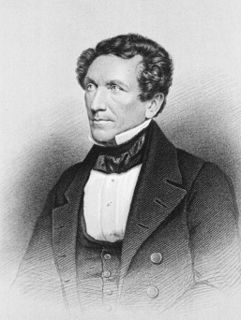
David Macbeth Moir was a Scottish physician and writer.
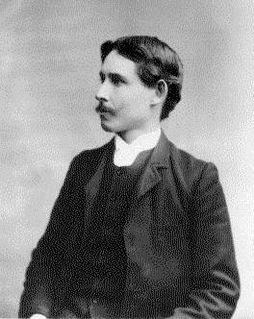
Archibald Lampman was a Canadian poet. "He has been described as 'the Canadian Keats;' and he is perhaps the most outstanding exponent of the Canadian school of nature poets." The Canadian Encyclopedia says that he is "generally considered the finest of Canada's late 19th-century poets in English."
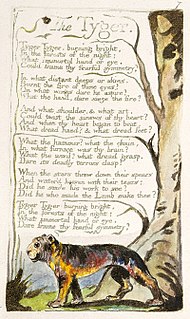
"The Tyger" is a poem by the English poet William Blake, published in 1794 as part of his Songs of Experience collection and rising to notoriety in the romantic period. It has been the subject of both literary criticism and many adaptations, including various musical versions. The poem is one of the most anthologised in the English literary canon. The poem explores and questions Christian religious paradigms prevalent in late 18th century and early 19th century England, discussing God's intention and motivation for creating both the tiger and the lamb.

Sir Charles George Douglas Roberts was a Canadian poet and prose writer. He was one of the first Canadian authors to be internationally known. He published various works on Canadian exploration and natural history, verse, travel books, and fiction." He continued to be a well-known "man of letters" until his death.

Canadian Gaelic or Cape Breton Gaelic, known in Canadian English as often simply Gaelic, is a collective term for the dialects of Scottish Gaelic spoken in Atlantic Canada.

William Wilfred Campbell was a Canadian poet. He is often classed as one of the country's Confederation Poets, a group that included fellow Canadians Charles G.D. Roberts, Bliss Carman, Archibald Lampman, and Duncan Campbell Scott; he was a colleague of Lampman and Scott. By the end of the 19th century, he was considered the "unofficial poet laureate of Canada." Although not as well known as the other Confederation poets today, Campbell was a "versatile, interesting writer" who was influenced by Robert Burns, the English Romantics, Edgar Allan Poe, Ralph Waldo Emerson, Henry Wadsworth Longfellow, Thomas Carlyle, and Alfred Tennyson. Inspired by these writers, Campbell expressed his own religious idealism in traditional forms and genres.

William Dunlop also known as Tiger Dunlop, was an army officer, surgeon, Canada Company official, author, justice of the peace, militia officer, politician, and office holder. He is notable for his contributions to the War of 1812 in Canada and his work in the Canada Company, helping to develop and populate a large part of Southern Ontario. He was later elected as a Member of Parliament for the Huron riding in the 1st Parliament of the Province of Canada, Canada West.
Nationality words link to articles with information on the nation's poetry or literature.
Nationality words link to articles with information on the nation's poetry or literature.
Nationality words link to articles with information on the nation's poetry or literature.
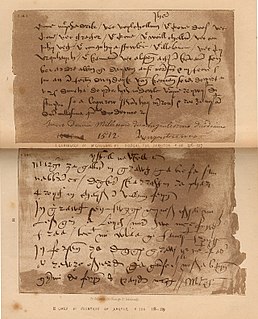
The Book of the Dean of Lismore is a Scottish manuscript, compiled in eastern Perthshire in the first half of the 16th century. The chief compiler, after whom it is named, was James MacGregor, vicar of Fortingall and titular Dean of Lismore Cathedral, although there are other probable scribes, including his brother Donnchadh and William Drummond, curate of Fortingall. It is unrelated to the similarly named Book of Lismore, an Irish manuscript from the early 15th century.
"Confederation Poets" is the name given to a group of Canadian poets born in the decade of Canada's Confederation who rose to prominence in Canada in the late 1880s and 1890s. The term was coined by Canadian professor and literary critic Malcolm Ross, who applied it to four poets – Charles G.D. Roberts (1860–1943), Bliss Carman (1861–1929), Archibald Lampman (1861–1899), and Duncan Campbell Scott (1862–1947) – in the Introduction to his 1960 anthology, Poets of the Confederation. He wrote, "It is fair enough, I think, to call Roberts, Carman, Lampman, and Scott our 'Confederation poets.'"
Scottish Gaelic literature refers to literature composed in the Scottish Gaelic language, a member of the Goidelic branch of Celtic languages, along with Irish and Manx.
Alexander Balfour (1767–1829) was a Scottish novelist born in the parish of Monikie, Forfarshire.
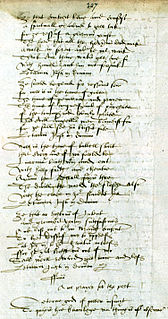
Poetry of Scotland includes all forms of verse written in Brythonic, Latin, Scottish Gaelic, Scots, French, English and Esperanto and any language in which poetry has been written within the boundaries of modern Scotland, or by Scottish people.

Scottish literature in the nineteenth century includes all written and published works in Scotland or by Scottish writers in the period. It includes literature written in English, Scottish Gaelic and Scots in forms including poetry, novels, drama and the short story.
References
- ↑ Fowke, Edith, "Canadian Boat Song", The Canadian Encyclopedia, retrieved 5 December 2011
- ↑ Moore, Thomas A Canadian Boat Song London: J. Power (1805) Library and Archives Canada - Amicus #4121845
- ↑ The tune for A Canadian Boat Song by Thomas Moor
- 1 2 3 4 Dowler, Linda (1980), "The authorship of the "Canadian Boat-Song": a bibliographical note", Canadian Poetry, 6, archived from the original on 2012-12-21, retrieved 2011-12-06
- 1 2 Gerson, Caroline; Davies, Gwendolyn (2010), Canadian poetry from the beginnings through the First World War, McClelland & Stewart, ISBN 978-0-7710-9364-7
- 1 2 Bentley, D. M. R. (1980), "The "Canadian Boat-Song": a mosaic", Canadian Poetry, 6, archived from the original on 2014-10-19, retrieved 2011-12-06
- ↑ Draper, Gary (Spring–Summer 1980). Bentley, D.M.R. (ed.). "Tiger Dunlop and the Canadian Boat Song". Canadian Poetry. University of Western Ontario Canadian Poetry Press.